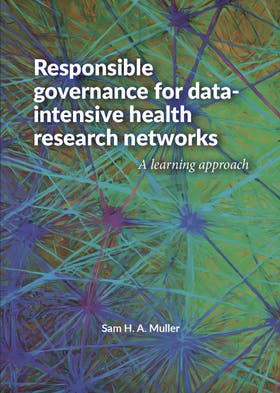Sam Muller
Responsible governance for data-intensive health research networks

- Datum
- (Co) promotoren
- 05-11-2023
- Promotoren:
Prof. dr. J.J.M. van Delden
Prof. dr. T. Schillemans
Copromotoren:
Dr. G.J.M.W. van Thiel
Mr. dr. M. Mostert
Samenvatting
Big Data hold great promise for scientific health research and healthcare. Yet data-intensive health research in which various types of data from different sources are collected, (re)used, shared and/or linked on a large scale also creates distinct problems. Data-intensive health research takes place in complex networks. In these networks, (semi-)public organisations like hospitals and private organisations like pharmaceutical companies collaborate, depending upon each other and sharing goals, interests, and motivations. Moreover, ethical and legal requirements and social demands need to be met to accomplish responsible data-intensive health research. This requires adequate coordination, that is, governance. By engaging in interdisciplinary, theoretical and empirical social sciences-bioethics research, this PhD thesis develops a learning approach for responsible governance of data-intensive health research networks. This research addresses three important challenges: (1) ethical and legal fragmentation, (2) connecting with stakeholders and society, and (3) untameable heterogeneity and complexity. First, the thesis analyses the role of accountability and impediments to health data sharing collaborations. Second, it considers the concept of social licence and the potential of dynamic interfacing for support and trust in data-intensive health research. Third, patient and public preferences for governance are studied and principled operational guidance is provided. This PhD thesis stipulates learning governance for responsible data-intensive health research, which employs situated social and structural circumstances. Learning governance relies on performance feedback and dialogue about experiences with implementation of provisional norms, goals and governance arrangements. Such governance is characterised by self-regulation, social sanctioning and self-organisation. This requires experimentalist design, strengthening of collective control and participatory governance arrangements.
